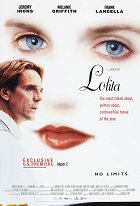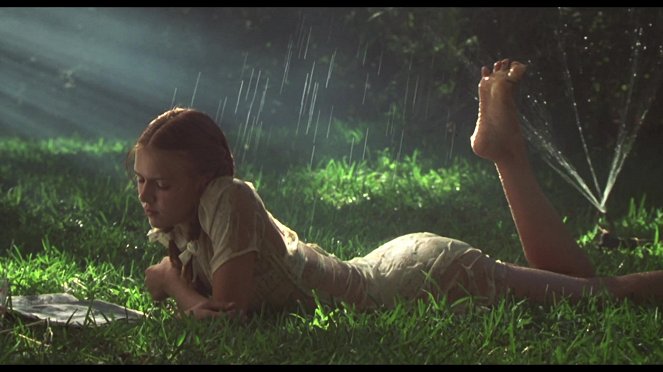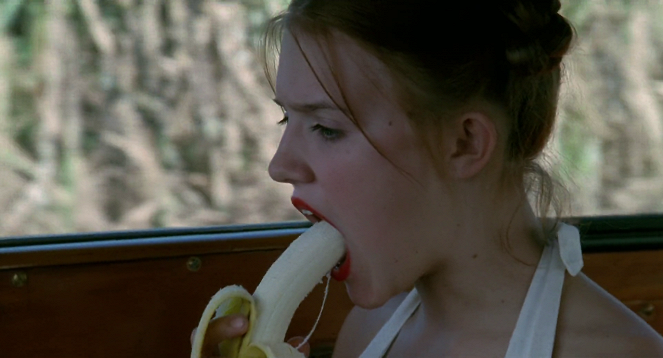Directed by:
Adrian LyneScreenplay:
Stephen SchiffCinematography:
Howard AthertonComposer:
Ennio MorriconeCast:
Jeremy Irons, Melanie Griffith, Frank Langella, Dominique Swain, Suzanne Shepherd, Keith Reddin, Erin J. Dean, Ed Grady, Angela Paton, Ben Silverstone (more)VOD (1)
Plots(1)
The year is 1947 and Humbert Humbert, a professor of French literature, travels to a small town to take a teaching post. He rooms with a sexy widow named Charlotte Haze and her 12-year-old daughter Lolita. Charlotte sees the dashing Humbert as the fulfillment of all her dreams and avidly begins to pursue him as a future husband. But the professor carries with him a poisonous wound: the indelible memory of a frustrated childhood romance that ended with the untimely death of his 12-year-old love. The unrequited past pushes Humbert towards the fulfillment of his own dreams: Lolita. While Charlotte courts Humbert, he finds himself courting Lolita. Through an extraordinary series of twists, Humbert wins her affections until the evil Quilty enters the picture. Together the oddest of couples sets off on a cross-country trip across America that concludes in tragedy. (official distributor synopsis)
(more)Videos (1)
Reviews (4)
Lyne’s Lolita is more complex in its depiction of the feelings of the main character, Humbert, than Kubrick’s version. It conveys his tragic story to the viewer more poetically through the dreamy expression and voice of Jeremy Irons, underscored by Morricone’s melancholic music. After all of the relationship woes, the prologue is very nicely connected with the epilogue... Lyne’s other ace up his sleeve is a more open yet still subtle portrayal of the couple’s intimate relationship. It was also a good decision to focus less on Lolita’s mother and her relationship with Humbert, which in Kubrick’s case was justified only as a substitute for what he couldn’t dare to put in the film at the time. I also value the more furtive evil character of Quilty. Overall, this is a more expressive and satisfying film than the “original”.
()
Since some time had passed since I saw the first adaptation, I took the time to revisit Lolita. And I actually like this better. The 1940s are portrayed very authentically (similarly well as later in On the Road), and even the key prologue from the 1920s feels very natural. The details are almost genius in places, such as in the selection of magazines and comics that Lolita and her lover read. Lolita herself is very lively, real and sexy, and not as artificial and affected as Sue Lyon was years ago. Jeremy Irons is great, at times almost vulnerable in his infatuation and tough and mean in his scenes with adults. But it’s too bad that a lot of scenes with Melanie Griffith were cut because, after all, the resulting film is too tight and seems to take place only between the main couple. As originally filmed, the scenes with Lolita's mother helped anchor the story in reality, and their reduction moved the whole towards a more dreamlike tone.
()
A poetic film with a brilliant performance by Jeremy Irons and the actress playing Lolita, who might even deserve an Oscar. Some moments are truly captivating, but towards the end, the excitement and enthusiasm quickly fade away.
()
I know exactly what I will feel when I see Lolita again. I will be in awe of the enchantingly seductive Dominique Swain, I will have tears of longing for Lolita, and for two hours, I will be Humbert, who would sacrifice and abandon everything for another moment with Dolores in his arms. What Jeremy Irons delivers in the lead role is not just good acting, it is the complete embodiment of the character, perfect harmony with the character's nature, and the materialization of all male passions and desires, even in an unhealthy form. So when I see Lolita again through his eyes, I will feel the kind of love that changes lives.
()




Ads